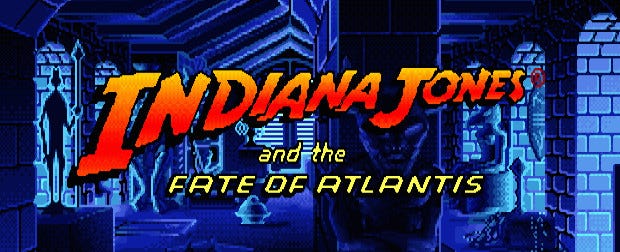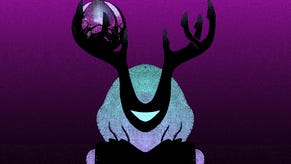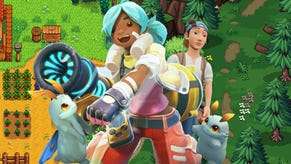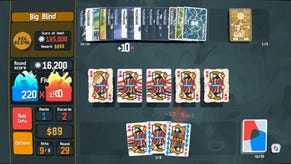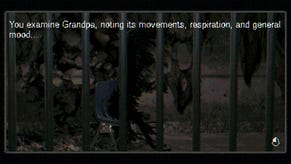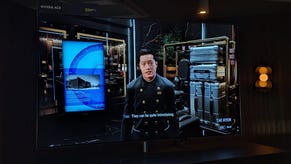S.EXE: Indiana Jones And The Fate Of Atlantis
Hollywood Romance
A long time ago, when I was just a fledgeling writer who had just attended her first Game Developer's Conference and only accidentally brushed shoulders with Tim Schafer at a bar, I was surprised to get a message on Facebook from Noah Falstein. He had noticed that my cover image was of the 1992 LucasArts point and click adventure Indiana Jones and the Fate of Atlantis. He saw it on my page thanks to a connection of a friend of a friend. He 'liked' it. And I realised: Noah wrote that game.
I guess that was the moment I knew I was privileged to be able to talk to the people who make the things I care about, and that I should spend my time critiquing their work. This week's S.EXE is about the 'team' narrative strand of Indiana Jones And The Fate Of Atlantis. It's got clinches worthy of Hollywood. I've not seen a kiss in a game that's ever topped Sophia and Indy's frequent tonsil-scraping embraces.
People lament the lack of 'romcom' in video games, and every time they do I think about Fate Of Atlantis. There are a lot of things that games can learn from Hollywood movies, and often they take all the wrong things. There's hardly any romance in big budget games. There's hardly any flirting. There's not even that much sex, until David Cage attempts, slightly ineptly, to do it. Recently, independent designer Brendon Chung of Blendo Games has been making the most headway with cinematic-influenced innovations: He uses smash cuts to keep his plots relevant and his player engaged. To a certain extent, Luis Hernandez's Jazzpunk does that too. Both game makers' works are well worth investing in. Thirty Flights of Loving, Brendon's last masterpiece, even indulges romantic mood and little action set pieces to evoke a feeling of epic romance, even if there's no dialogue.
But Fate Of Atlantis has a whole branch of dialogue and puzzles dedicated to what in film is known as Screwball Comedy. Fate of Atlantis is an adventure game where a quarter of the way in you can choose three different ways to navigate the rest of the game: Wits, Fists or Teamwork. The 'wits' path obviously emphasised problem solving and puzzles, 'fists' put the solutions mostly on you punching someone in the face (although the fighting system in this game was unreliable, clunky, jerky stuff), and the team path put you slap bang in the middle of the screwball comedy that I'm going to focus on. Of course, this followed suit from the forays the first two Indiana Jones films made into the genre.
Almost all of the LucasArts adventure games around this point were deftly sewn together with excellent narrative design and dialogue, even if sometimes the games were plagued with lengthy backtracking, infuriatingly impenetrable puzzles (see Full Throttle's kicking the brick wall puzzle that almost had me destroy my computer) (I think Tim Schafer has since issued a mea culpa) and occasionally just irritating pathfinding and navigation. Fate of Atlantis has several such problems, the worst being parts where you have to align a thingummy with another thingummy to see a thingummy, which happens several times in several different ways, and is never not annoying.
You wish that the little mechanisms of the game actually flowed better and helped the narrative pacing better quite often. But Fate of Atlantis opens very promisingly: it does what few games do, which is involve you in a Precredits Sequence! The game makers' names appear at the bottom of the screen, and you're playing a little beginning vignette where Indiana Jones gets lost and injured in his own museum. It's wonderfully paced, since you find a particular curiosity in each room that then furthers the sequence, and triggers the next part of the soundtrack until you drop into the plot you're meant to be participating in. It's a very efficient way of telling you, simply, that your job is to pick up stuff and learn about your environment to further the story. Set in Barnett College, it also does a lovely job of preserving the feel and the 'lore' of the Indiana Jones films - it is obvious everyone involved on this game did their homework.
As Spielberg has often discussed, Indiana Jones is the reckless American counterpart to the more straight-laced James Bond, though Indy's love interests tend to play a much more important role in the dynamic of his films. The strongest of these I think is Marion Ravenwood from Raiders of the Lost Ark (which despite much argument with friends about the merits of prequel Temple of Doom, probably still remains my favourite Indy film even if it is not the best one). Marion began Raiders with trousers on and graduates to flapping about uselessly in a dress, which is indicative of how her role in the action deteriorates into a traditionally passive 'rescue me' one, though obviously dresses are rad and Karen Allen looks great in them.
This trope has a much longer tail than just an Indiana Jones movie, and it's intended as an 'homage' to older more conservative matinee adventure movies, but it's still a little sad to witness fightin' drinkin' Marion squeal for Indy and become more inclined to ask him for help rather than get herself out of things, since that's what one might describe as out of character for her, or her sharp decline into wussiness maybe even indicateslazy writing. It's inconsistent with the contract Marion's character makes with the viewer at the beginning of the film. In contrast, Indy is consistently action and interrogation from beginning to end, and the reasons for his decisions are pleasingly transparent.
Is it obvious yet that I have spent too much of my life loving these films, attempting to dissect their flaws and virtues? I digress.
The makers of Fate of Atlantis paid attention to these tropes particularly well, because Indiana and his new love interest in this game, Sophia Hapgood, both play very similar roles to that of Indiana and Marion. Sophia wears jeans, but she also wears a taupe jacket that is very similar to the one that Indy wears. In some respects the game is actually more progressive than Raiders. Sophia is the intellectual equal of Indiana Jones, often chiding his misunderstandings and supplying academic archaeological information. She disagrees with him often, makes jokes at his expense ("he's named after the family dog!" she tirelessly reminds everyone she comes across, to Indy's dismay) and early on in the game it's necessary for the player to switch into controlling Sophia to solve a puzzle. This isn't just a game where you play the titular hero: Sophia's capabilities and agency aren't just written but shown, and the player is invited to navigate some of the game as her.
My favourite line early on in the game is Indy's comment to his exaggeratedly British-sounding Marcus that the time that he spent on a dig with Sophia, a rich Bostonian research assistant, was 'the coldest year of his life'. I choose to think that this is less a comment on the weather but that he slept with her and was an asshole about it afterwards. Or he didn't sleep with her and she was annoyed about it. It's a great line.
Another interesting dynamic in Indy's relationship with Sophia is the 'mystical' role that she plays to his 'rational'. It's traditional to make women play the 'emotional' 'irrational' one, even though male action hero characters are much more likely to get angry or sleazy. But Sophia is the one most likely to get angry, and she's often quite mercenary. Sophia's character is portrayed as a half-fraud psychic who is using her academic knowledge of Atlantis to prize money from gullible New Yorkers (as if there is such a thing), but she does actually believe in her own powers, and several times is actually shown to be the True Mulder figure. She actually bears witness to the supernatural. It's Indy, the 'Scully' figure, the one that doesn't like the 'supernatural mumbo jumbo' that looks ridiculous for not believing her in the end.
What demonstrates Indy and Sophia's romantic tension so well is the squabbling and making jokes at each other's expense. There's an equality implied from giving as good as you get. The voice acting is particularly exceptional for a game of this era, which really enhances how biting the comebacks can be. Sophia and Indy also do a lot of working together, using distraction techniques, conversational traps, and helping each other open doors. The action could be more weighted towards Sophia, but unfortunately the game is named after Indy and he gets the majority of the verbs. Perhaps my favourite thing about Sophia is that in every situation she knows just as much as Indy, and she never gets scared. Most of the slapstick laughs are played at Indy's expense: Indy comes back to pull up the gate to a prison that Sophia has been stuck in by an evil Nazi, and he wobbles around almost dropping it whilst Sophia chastises him and tries to find a rock to jam the mechanism.
The best romantic moments in the game entail kisses on the mouth. Leading up to the moment I've just described, Indy was deprived of Sophia's company for quite some time as he traversed ancient caverns alone. It's true that you miss her and the spunky dialogue. When Indy releases her from her prison later by way of negotiating a puzzle (2.39 in the longplay video), they both have a little strop and a playful sort of comedic argument, cutscene style (it happens automatically and is not open to giving the player options). He takes her in his arms and kisses her in what one assumes is a flood of the emotion 'thank god you are not dead'.
Someone pointed out on Twitter that Marion's claim to Indy in Raiders, 'It was wrong and you knew it!' with regard to their young pre-cinematic relationship sounds a lot like a statutory rape accusation. It's interesting to note that Indy's sexuality is somewhat coloured by 'roughness', 'taking charge', 'taking what he wants' et cetera. Though as a girl I was always taught to look for those qualities in men by mass media, I've never actually experienced that behaviour in real life as a good thing. Often the men that try to 'take' something from you are doing it because you're not into giving it to them. And yet, I've never read Marion's accusations as more than a 'you shouldn't have lead me on/left me without saying goodbye' type of forlorn teen love accusation, but I'm willing to concede that it might say something worse about Indy that I've never considered.
In that light it's sort of a terrible thing for Indy to essentially take a girl in his arms and kiss her without permission. But there are more nuances at work. In my experience there's a lot of 'reading the air' that the road to kissing entails - there's knowing the other person well, there are signals to consider, there's how many times your skin has touched without the other person pulling away, how comfortable you feel in each other's personal space. Proximity is very important in the pre-kiss mindread. If you get it wrong it can be embarrassing and occasionally for the other person, terrifying.
But the important thing is that throughout the game Indy and Sophia have built up a relationship that indicates feelings of closeness are mutual. Not only did they know each other years ago, but they have grown comfortable and flirty with each other, as shown through wit and gentle ribbing. If the kiss had come early in the game, it would have been out of place. Lots of narrative work shores up this moment.
In any case, it looks like Sophia initiates a second golden era-style kiss immediately afterwards, and initiates more flirting, which means (at least to me) that Indy read it right. Hurray! The rescuer/rescuee dynamic still isn't great though: it leads to that weird feeling like you 'owe' your rescuer something, and I don't know if I've mentioned this before, but sex is not a reward for good or bad behaviour, it is a recreational thing (unless babyplan) that two people embark on because they both feel like it.
But I mean, I'd do Indy. So. These things are complicated.
At the end Indy and Sophia stand on a Nazi submarine kissing whilst Atlantis explodes in a shower of lava and sinks into the sea. What could be more romantic?
An incredible game, with some beautiful art. Still the best Indiana Jones game, to my mind.
Incidentally, Kate Simpson is writing all about The Witcher and sexuality right now, and it's spectacularly illuminating.
The previous S.EXE columns are here.
